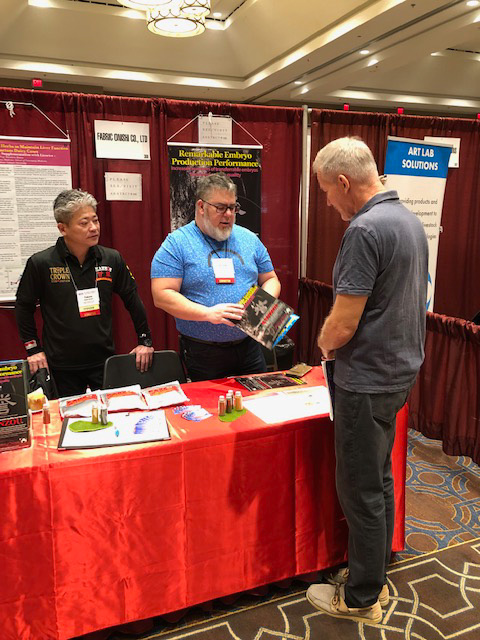2019/02/05
Effect of feeding a licorice extract to Japanese Black cows on embryo production performance after superovulation treatment
Yoshito Aoyagi, Makoto Takeuchi, Yoshio Oono, Manami Urakawa, Masateru Koiwa
The objective was to determine the effect of feeding a licorice extract that contains glycyrrhizic acid, which is known to have a liver function-enhancing effect, on embryo production performance after superovulation treatment in Japanese Black cows. Japanese Black breed cows (n=136) that had calved 1 to 4 times and had normal uteri as seen by ultrasonography after at least 40 days from the last calving were used as test animals. Animals in the treatment group (n=90) were continuously fed 20g head / d /of a licorice extract (Kanzou, Fabric Onishi Co. Ltd., Fukuoka, Japan), with at least 13% glycyrrhizic acid content) once a day, mixed with the formula feed, for 60 to 90 days starting from around the day of calving until ova/embryos were collected. The control group (n=46) received no Kanzou from the day of the last calving until ova/embryo collection. A total of 20 Armour units (AU) of FSH (Antorin R, Kyoritsu Seiyaku Corporation, Kanagawa, Japan) from porcine pituitary was given intramuscularly (IM) twice a day, morning and evening, for 3 consecutive days (decreasing dose schedule: 5 AU×2, 3 AU×2, and 2AU×2) as the superovulation treatment to the cows at 8 to 11 days post-oestrus in both groups. Prostaglandin F2α 25mg and 15mg (IM) were administered in the morning and evening, respectively, on the third day of FSH administration. Artificial insemination was done at 12 and 24h after the start of oestrus, and ova/embryos were collected using a uterine reflux method on Day 7 post-oestrus. The mean numbers of ova/embryos and transferable embryos collected and the mean embryo quality scores (according to the IETS guidelines) in the treatment and control groups were compared by t-test. A chi-squared test was used to compare the proportion of transferable embryos in the 2 groups. There was no significant difference in the mean number of ova/embryos retrieved between the treatment group (21.7±11.8) and the control group (15.8±11.3), although the former tended (P=0.07) to yield more ova/embryos. There was significant difference (P<0.05) in the mean number of transferable embryos collected in the treatment group (13.1±8.3) than in the control group (8.1±5.3). The mean embryo quality score was significantly greater (P<0.01) in the treatment group (1.6±0.4) than in the control group (2.2±0.6). The proportion of transferable embryos in the treatment group (60.3±26.4%) was also significantly higher (P<0.05) than in the control group (51.2±26.0%). In conclusion, feeding a licorice extract to Japanese Black cows for 60 days or longer improves the quality of embryos obtained after superovulation treatment and leads to an increase in the mean number of transferable embryos per cow.
<第45回IETSブース会場>

